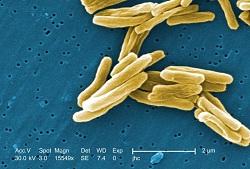Using AI to control energy for indoor agriculture
30 September 2024
Published online 24 November 2013

Saudi Arabia is facing an increased public-health threat from African and Asian immigrants with tuberculosis, according to a study published in PLoS One1. The researchers found similar strains of the bacterium that cause the disease circulating among both locals and immigrants, suggesting disease transmission between these populations.
Researchers analysed 524 samples of Mycobacterium tuberculosis, the bacterium that causes tuberculosis, collected from Saudi Arabian and immigrants working and living in the industrialized Eastern province of Saudi Arabia
People are drawn to Saudi Arabia for work, jobs that often bring immigrants in close contact with local people. For instance, many of the Indonesian and Filipino migrants live in Saudi Arabian households, as maids, cooks or drivers. The researchers contend that this close proximity is having an impact on the TB epidemiology in Saudi Arabia — with transmission more frequent in households that employ immigrants.
A total of 389 cases, or two thirds, of all those surveyed had active pulmonary TB in the lungs, while infection has spread beyond the lungs in 135 people. Cases of extrapulmonary tuberculosis were relatively more frequent among Saudis. About three quarters of patients from the immigrant group tested positive for pulmonary TB.
"TB-causing bacterial strains are circulating among both native and expatriates," says Sahal Al-Hajoj, a researcher from the King Faisal Specialist Hospital and Research Centre, Riyadh, and co-author of the study. "This [suggests] an on-going transmission between these populations."
Data collected over the past few years by the Saudi tuberculosis registry shows non-Saudi Arabians have nearly double the TB incidence rates of Saudi nationals2. The number of immigrants in Saudi Arabia has increased from 5.2 million people in 2000 to 8.97 million in 2010ref3,4 , with 1.21 million settling in the region studied.
The Saudi health ministry is working with the World Health Organization to control the spread of the disease, says Ziad Memish, deputy health minister for Saudi Arabia. "Teams visit TB patients in their homes to provide them with anti-TB drugs." All diagnosis and treatment is also being provided free of charge for both Saudi nationals and immigrants.
About 20% of the strains isolated showed some degree of drug resistance, with 2.5% having multi-drug resistance. Hajoj says a TB control programme should be rolled out throughout the Kingdom, and it should prioritize the treatment of drug-resistant cases to limit its spread. However, any such programme would be difficult to implement, especially among illegal immigrant populations who fear deportation.
"In some instances, the patients run away from hospital after their conditions improve without total elimination of TB bacteria. This gives the chance for the remaining TB bacteria to develop resistance to drugs," Hajoj warns.
doi:10.1038/nmiddleeast.2013.219
Stay connected: